You have /5 articles left.
Sign up for a free account or log in.

Getty Images
The Trump administration on Wednesday said it would bar scientists at federal agencies from pursuing research using fetal tissue and add new hurdles for researchers on college campuses to renew funding for research using the materials. It also said it would drop a contract with the University of California, San Francisco, to research HIV infection using the tissue.
Funding of other nongovernmental research labs is unaffected by the decision. But the announcement is a clear win for anti-abortion groups that had pushed the Trump administration for months to restrict scientific work conducted with fetal tissue from elective abortions.
It also puts researchers at universities on notice that they could face more hurdles down the road getting federal support for such work.
“I think everyone who has an existing grant will be thinking very strategically about what their future steps will be,” said Joanne Carney, director of government relations at American Association for the Advancement of Science. “Do you take a chance pursuing federal funds, or do you look to the private sector or international collaborations?”
Future grants for research that proposes to use fetal tissue will also have to go through an ethics advisory board that could slow the award process as well. That could also mean slower development of breakthroughs for vaccines or other research with a public health imperative, said Lizbet Boroughs, associate vice president for federal relations at the Association of American Universities.
The Department of Health and Human Services, after pressure from anti-abortion groups and members of Congress, launched a review last year of all federal fetal tissue research. Shortly thereafter, it said it would block the National Institutes of Health from acquiring new fetal tissue.
In a statement Wednesday, HHS said that review contributed to new restrictions on federal research and to the termination of a contract with the University of California, San Francisco, to study potential HIV therapies. The long-term status of that contract was put in doubt last year after the Trump administration began issuing 90-day extensions instead of the typical one-year renewal.
“Promoting the dignity of human life from conception to natural death is one of the very top priorities of President Trump’s administration,” said the statement from the agency. “The audit and review helped inform the policy process that led to the administration’s decision to let the contract with UCSF expire and to discontinue intramural research -- research conducted within the National Institutes of Health (NIH) -- involving the use of human fetal tissue from elective abortion. Intramural research that requires new acquisition of fetal tissue from elective abortions will not be conducted.”
UCSF chancellor Sam Hawgood told The Washington Post that the university considered the decision “to be politically motivated, shortsighted and not based on sound science.”
Doug Melton, the president of the International Society of Stem Cell Researchers, said in a statement that the new restrictions issued Wednesday had no scientific or ethical basis and will delay the development of new medical treatments.
“Research using fetal tissue has saved millions of lives through the development of vaccines for diseases that once ravaged communities across the world,” Melton said. “Polio is now almost eradicated, and rubella, measles, chicken pox and rabies are all preventable diseases because of fetal tissue research.”
Marjorie Dannenfelser, president of the anti-abortion Susan B. Anthony List, called the announcement a "major pro-life victory" in a statement.
"Taxpayer funding is better spent promoting alternatives that are already being used in the production of treatments, vaccines and medicines and to expand approaches that do not depend on the destruction of unborn children often through late-term abortion," she said.
Scientific groups, though, say that no suitable alternatives to fetal tissue exist.
After HHS announced the review of fetal tissue research last year, academic groups and scientific organizations said they were optimistic their voices would be heard. The administration hadn’t released its findings before the announcement Wednesday, however, and several scientific groups said they hadn’t seen the final review.
The impact of the new requirements for scientists studying fetal tissue won’t be clear until the next round of research grant renewals. But academic groups expect that the imposition of new ethics review boards could seriously stall that process.
“We’re concerned. We think there are already all kinds of ethical guidelines that researchers have to follow,” Boroughs said. “We think this is an unnecessary hurdle for researchers and for patients.”




